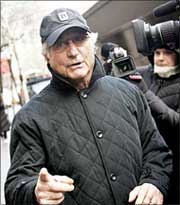Bernie Madoff's game got over some time in March 2009. His investment advisory business, Madoff admitted, was a gigantic Ponzi scheme. He had defrauded thousands of high net-worth investors of billions of dollars. This was the mother of all Ponzi schemes and Madoff has been sentenced to 150 years in prison, the maximum for felony. The damage when the dust settled was calculated at $65 billion.
 Till his cover was blown, Madoff was a venerated name in the world of finance. Nobody gave better returns to investors than Madoff. He donated liberally for social causes and to political parties. He was a founder-member of Nasdaq. There was little evidence on the ground to doubt his credentials.
Till his cover was blown, Madoff was a venerated name in the world of finance. Nobody gave better returns to investors than Madoff. He donated liberally for social causes and to political parties. He was a founder-member of Nasdaq. There was little evidence on the ground to doubt his credentials.
Ten years before Madoff confessed, Harry Markopolos was convinced that not all was above board. Wealth managers who had engaged Madoff had huge returns to show. They consistently outperformed the market. Markopolos, an analyst with a fancy for numbers, was asked by his superiors to work out an investment model that would give similar returns. Whichever model he tried, he could not come up with one that gave returns similar to Madoff's.
This made him suspicious. Such returns were possible, he concluded, only if Madoff was running a Ponzi scheme. In other words, there was a possibility that he did not invest the money in the market; the returns could have come out of the money paid by the new investors. And this is what exactly happened.
Markopolos was the whistleblower nobody believed at first. He went to the Securities Exchange Commission about Madoff way back in 1999. Over the next few years, he made several more presentations. But all his pleas fell on deaf ears.
The body of evidence he had put together against Madoff was impressive. The trades he carried out were suspicious. His audit was handled by "a cousin". Nobody knew when he entered the market, and when he exited. What were the stocks he favoured? How did he collect market-sensitive information? All in all, there was an opaque wall behind which Madoff ran his devious schemes.
Why did the world not take Markopolos seriously? One reason could be that he was an outsider. The complaint had not come from one of Madoff's clients. That's not surprising. They had all got fantastic returns and had no reason to complain. For quarter after quarter, Madoff had outperformed the market. Everybody attributed it to Madoff's genius. Nobody wanted to be the devil's advocate.
Madoff's reputation in the stock market was the stuff legends were made of. Who could challenge him? It also tells of the apathy of the Securities Exchange Commission. For ten years, it sat on evidence and didn't move against the biggest fraudster in history!
In his public statements, Madoff said that he invested not more than seven or eight times in a year, that too for brief periods of time - never more than a few weeks. Yet, he offered his investors consistent returns of over 1 per cent a month.
In 1996, when the stock markets went into a decline, Markopolos cornered one of Madoff's men to explain the high returns. Madoff, he was told, had an uncanny ability to sense the market. He almost always invested when the market was on an upswing; and when the market went into decline, he converted his holdings into cash! There were several red flags out there, provided somebody was willing to see them.
Markopolos was not the only one to sense that all wasn't above board at Madoff's. A London fund of funds told Markopolos that it refused to have anything to do with Madoff, though he had approached it several times to invest with him. This is because Madoff did not allow it to carry out a due diligence on his business.
Madoff, to be sure, ran the world's largest hedge fund. And if somebody had spurned his advances, it should have set alarm bells ringing. But that didn't happen. Maybe when things are going well nobody wants to recognise an obvious but uncomfortable truth. That's what kept Madoff going all these years.
There were others who were convinced that Madoff was running a racket but they were all afraid to challenge the uncrowned king of Wall Street. The price to pay, if the charges on Madoff did not stick, would be very heavy and that's what deterred everybody.
The originator of the Ponzi scheme was a gentleman called Charles Ponzi. In 1991, there was a scheme that allowed people to buy postal coupons which could be redeemed in another country and that covered the entire cost of reply.
So, there was an arbitrage opportunity there. Ponzi began with an offer to double money in three months. And that's what he did for the first lot of investors. Such was the frenzy for his scheme - run ironically through a company called Securities Exchange Company -that he soon had to pay agents 10 per cent commission to get investors.
He successfully sued a journalist who suggested he was a fraud. Then it came to light that he was depositing his own money in a bank deposit that offered much lower returns.
The postal coupons he required for his scheme were way in excess of what was in circulation. Ponzi's fall was swift after that. He died in penury.
Image: Bernard Madoff walks to his apartment in New York.| Photograph: Shannon Stapleton//Reuters







 © 2025
© 2025